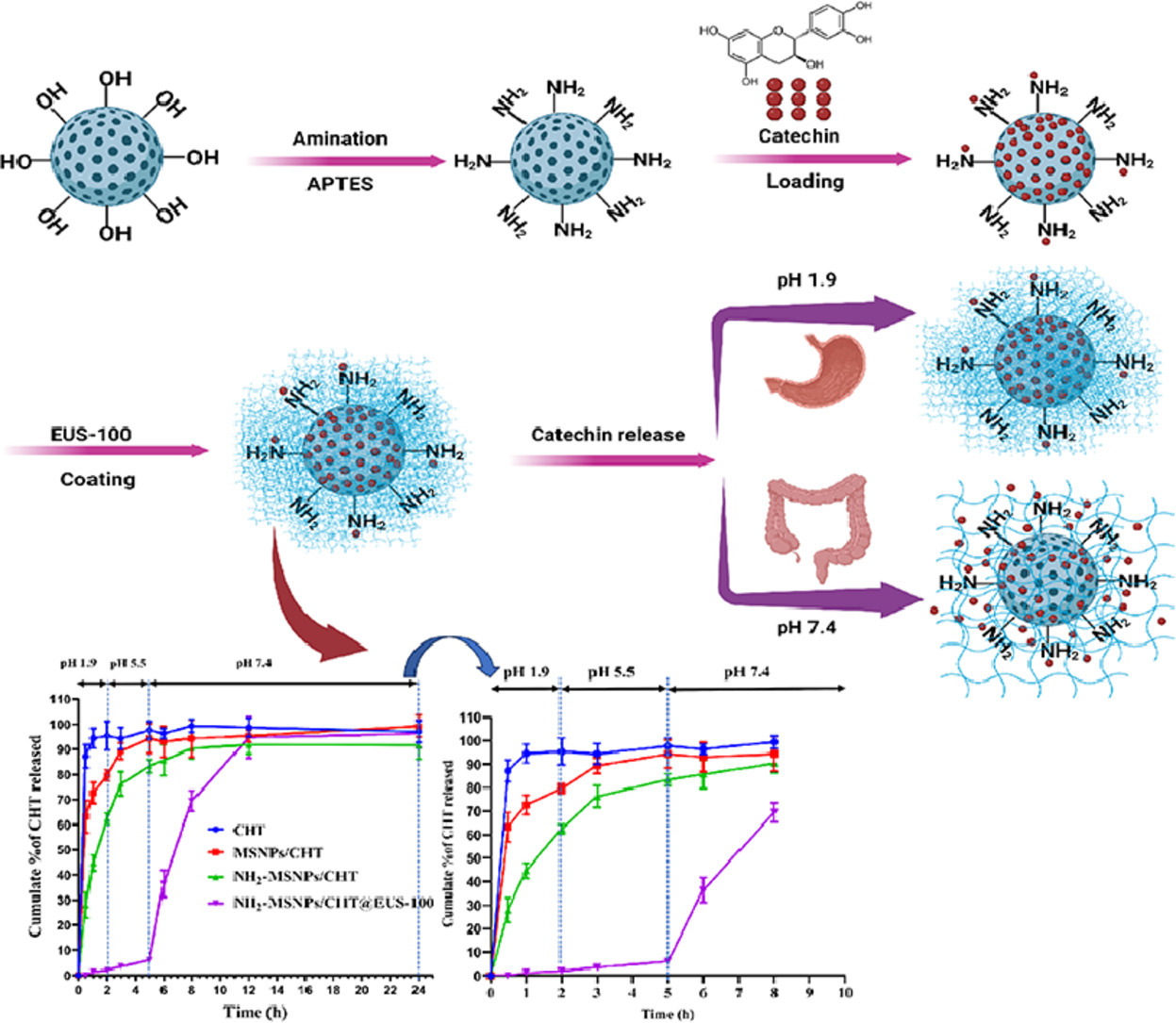A pH-sensitive silica nanoparticles for colon-specific delivery and controlled release of catechin: Optimization of loading efficiency and in vitro release kinetics

Catechin is a naturally occurring flavonoid of the flavan-3-ol subclass with numerous biological functions; however, these benefits are diminished due to several factors, including low water solubility and degradation in the stomach’s harsh environment. So, this study aimed to develop an intelligent catechin colon-targeting delivery system with a high loading capacity. This was done by coating surface-decorated mesoporous silica nanoparticles with a pH-responsive enteric polymer called Eudragit®-S100. The pristine wormlike mesoporous silica nanoparticles (< 100 nm) with high surface area and large total pore volume were effectively synthesized and modified with the NH2 group using the post-grafting strategy.
Various parameters, including solvent polarity, catechin-carrier mass ratio, and adsorption time, were studied to improve the loading of catechin into the aminated silica nanoparticles. Next, the negatively charged Eudragit®-S100 was electrostatically coated onto the positively charged aminated nanocarriers to shield the loaded catechin from the acidic environment of the stomach (pH 1.9) and to facilitate site-specific delivery in the acidic environment of the colon (pH 7.4). The prepared nanomaterials were evaluated using several methods, including The Brauner-Emmett-Teller, surface area analyzer, zeta sizer, Field Emission Scanning Electron Microscope, Powder X-Ray Diffraction, Fourier Transform Infrared Spectroscopy, Energy-Dispersive X-ray Spectroscopy, and Differential Scanning Calorimetry.
In vitro dissolution studies revealed that Eudragit®-S100-coated aminated nanomaterials prevented the burst release of the loaded catechin in the acidic environment, with approximately 90% of the catechin only being released at colonic pH (pH > 7) with a supercase II transport mechanism. As a result, silica nanoparticles coated with Eudragit®-S100 would provide an innovative and promising approach in targeted nanomedicine for the oral delivery of catechin and related medicines for treating diseases related to the colon, such as colorectal cancer and irritable bowel syndrome.
Download the full article as PDF here A pH-sensitive silica nanoparticles for colon-specific delivery and controlled release of catechin
or read it here
Materials
Catechin with Product No.: PHR1963 was purchased from Merck KGaA (Darmstadt, Germany). Tetraethyl orthosilicate (TEOS, 98%), cetyl trimethyl ammonium bromide (CTAB), 3-aminopropyltriethoxysilane (APTES), triethanolamine (TEA), hydrochloric acid (HCl, 38 %), absolute ethanol, methanol, dichloromethane (DCM), toluene and anhydrous N, N-dimethylformamide (DMF) were supplied by Sigma-Aldrich, Inc. (St. Louis, MO). EUS-100 was kindly provided by Evonik Röhm (GmbH, Germany). In addition, all the other solvents and chemicals were of analytical quality and used without any additional modification. In all experiments, the Milli-Q purification system supplied by EMD Millipore, Billerica (MA, USA) was utilized to generate ultrapure water with a specific resistivity of 18.2 M.cm at 25 °C.
Abdulsalam M. Kassem, May Almukainzi, Tarek M. Faris, Ahmed H. Ibrahim, Walid Anwar, Ibrahim A. Elbahwy, Farid R. El-Gamal, Mohamed F. Zidan, Mohamed A. Akl, Ahmed M. Abd-ElGawad, Abdelsamed I. Elshamy, Mohammed Elmowafy, A pH-sensitive silica nanoparticles for colon-specific delivery and controlled release of catechin: Optimization of loading efficiency and in vitro release kinetics, European Journal of Pharmaceutical Sciences,
Volume 192, 2024, 106652, ISSN 0928-0987, https://doi.org/10.1016/j.ejps.2023.106652.

